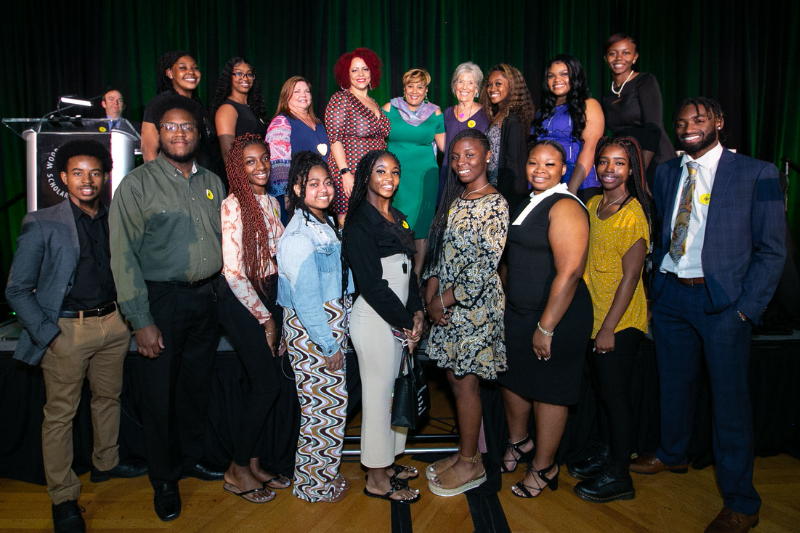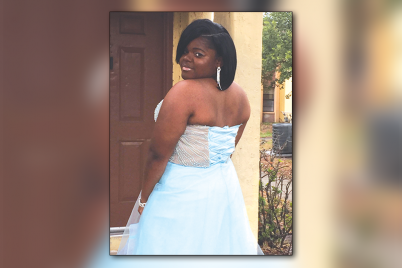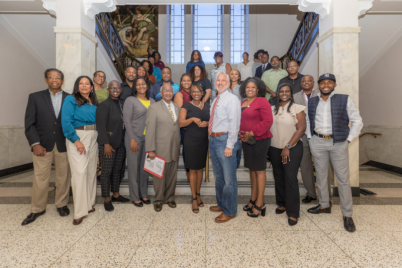Pulitzer Prize-winning journalist and creator of the ‘1619 Project’ Nikole Hannah-Jones, headlined this year’s sold-out Woodson Warriors Scholarship event, speaking on Black Americans’ central role in the nation. The sold-out event took place at the Coliseum in downtown St. Petersburg on March 27.
BY RAVEL JOY SHONEL, Staff Writer
ST. PETERSBURG — In its fourth year, the Woodson Warriors Scholarship donations have grown exponentially. Created to absorb some of the expenses parents incur while sending their children to college, this year’s fundraiser yielded $325,000 for 40 African-American scholars.
Terri Lipsey Scott, executive director of the Woodson African American Museum of Florida, explained that the scholarship fund’s success is owed to nationally recognized artist Jane Bunker, who got the ball rolling, and husband and wife duo Jeanne and Kevin Milkey of the Milkey Family Foundation, who pledged $50,000 annually for the next 10 years.
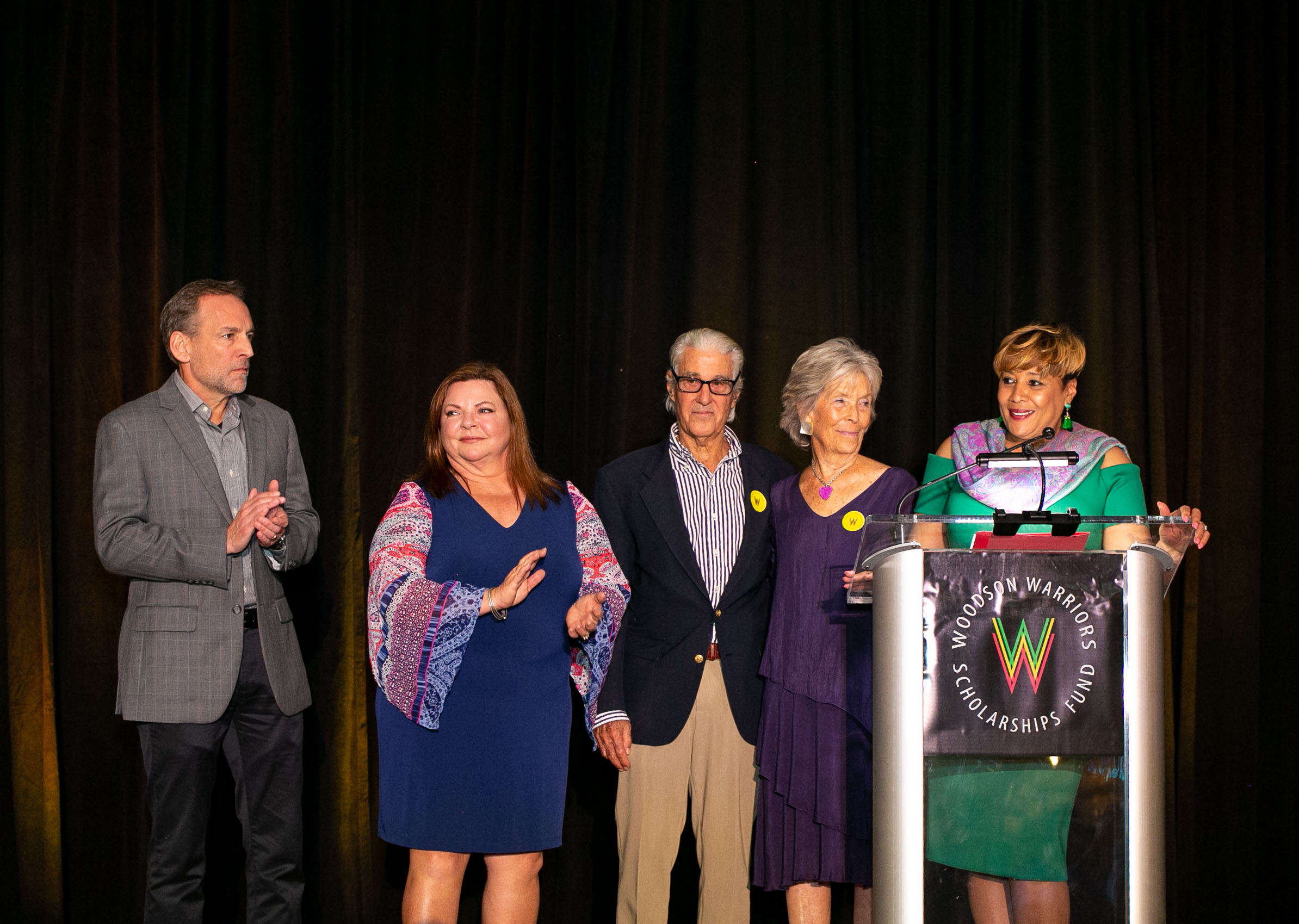
Terri Lipsey Scott (right), executive director of the Woodson African American Museum of Florida, explained that the scholarship fund’s success is owed to nationally recognized artist Jane Bunker, who got the ball rolling, and husband and wife duo Jeanne and Kevin Milkey of the Milkey Family Foundation, which pledged $50,000 annually for the next 10 years. Left, Kevin Milkey, Jeanne Milkey, Mason Bunker, Jane Bunker, and Terri Lipsey Scott
“I could not be more humble; I could not be more grateful. I cannot be more thankful for all that they have done to ensure the success of this program,” said Scott. “These individuals are certainly the foundation of one of the most extraordinary programs that we celebrate at the Woodson African American Museum of Florida.”
Keynote speaker investigative journalist Nikole Hannah-Jones certainly contributed to the sold-out crowd at Coliseum on Sunday, March 27. In 2015, she became a staff writer for The New York Times, and two years later was awarded a MacArthur Fellowship.
Hannah-Jones became a household name in 2019 when she produced a series of articles for a special issue of The New York Times Magazine entitled “The 1619 Project” that placed Black Americans at the center of the American narrative, winning her the Pulitzer Prize for Commentary in 2020. The book “The 1619 Project: A New Origin Story” followed in 2021.
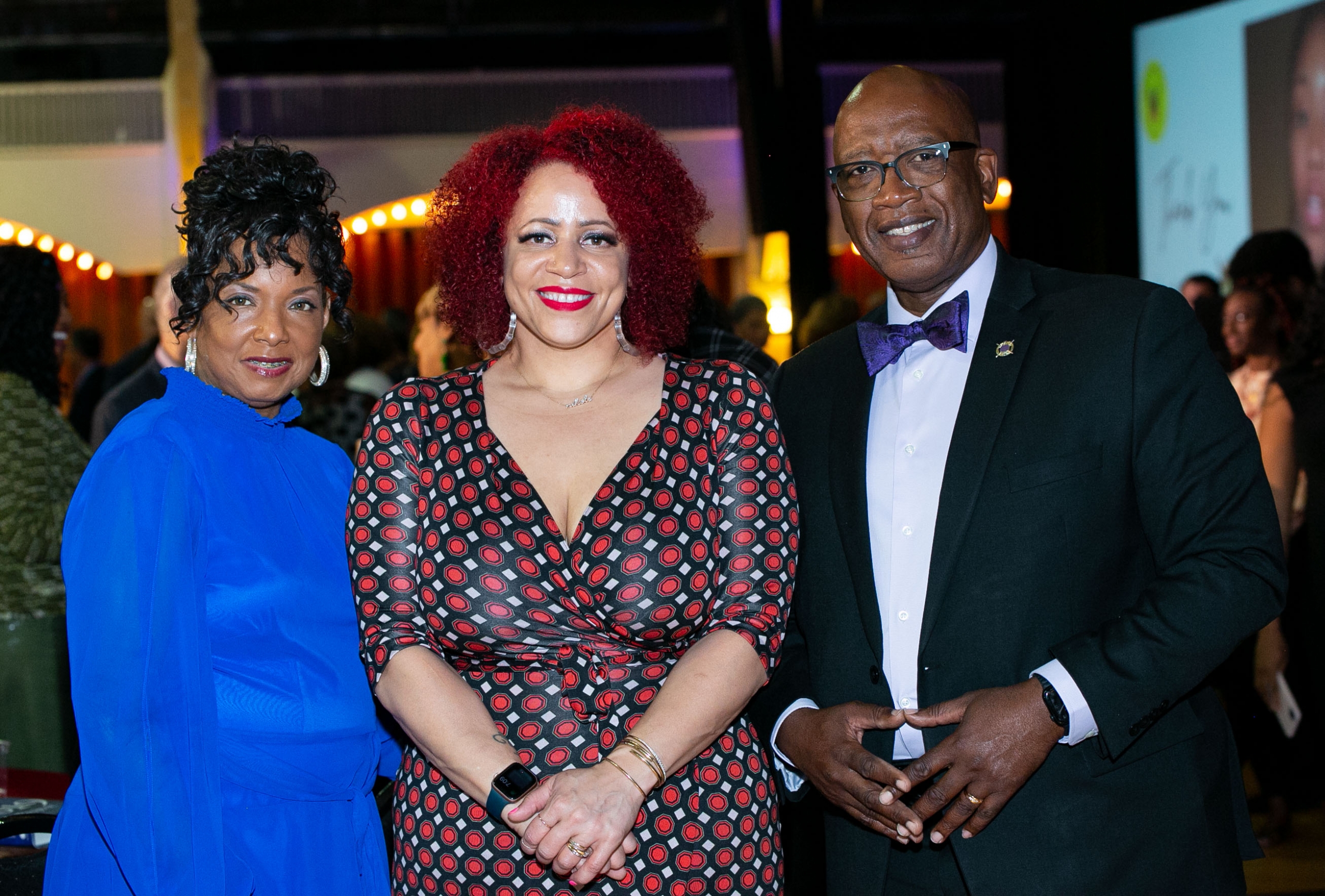
Councilwoman Deborah Figgs-Sanders, Nikole Hannah-Jones, and Mayor Ken Welch
Hannah-Jones said she was glad to be in Florida, a state that in some ways banned the journalism that she’s produced.
Sunday’s speech titled “1619 and the Fight for Democracy” was meant to “help us all rise and fight back against the authoritarianism that I think these anti-1619 laws are really showing us.”
She gave a brief synopsis of her work, explaining it was published to commemorate the landing of the first enslaved Africans in the British colony of Virginia in 1607. Twelve short years later, the colonists began trafficking Black bodies from Africa.
Hannah-Jones pointed out that slavery is one of the oldest institutions in the United States, and yet it’s treated as “an asterisk to the American story.” She said this country does not want to deal properly with its slaving past and what it means to be a country founded on ideals of inalienable rights.
“We are the only one of the countries in the Americas that were founded on the ideas that ‘we hold these truths to be self-evident that all men are created equal, endowed by the creator with inalienable rights,’ and yet one-fifth of the population of the 13 colonies was enslaved,” she asserted.
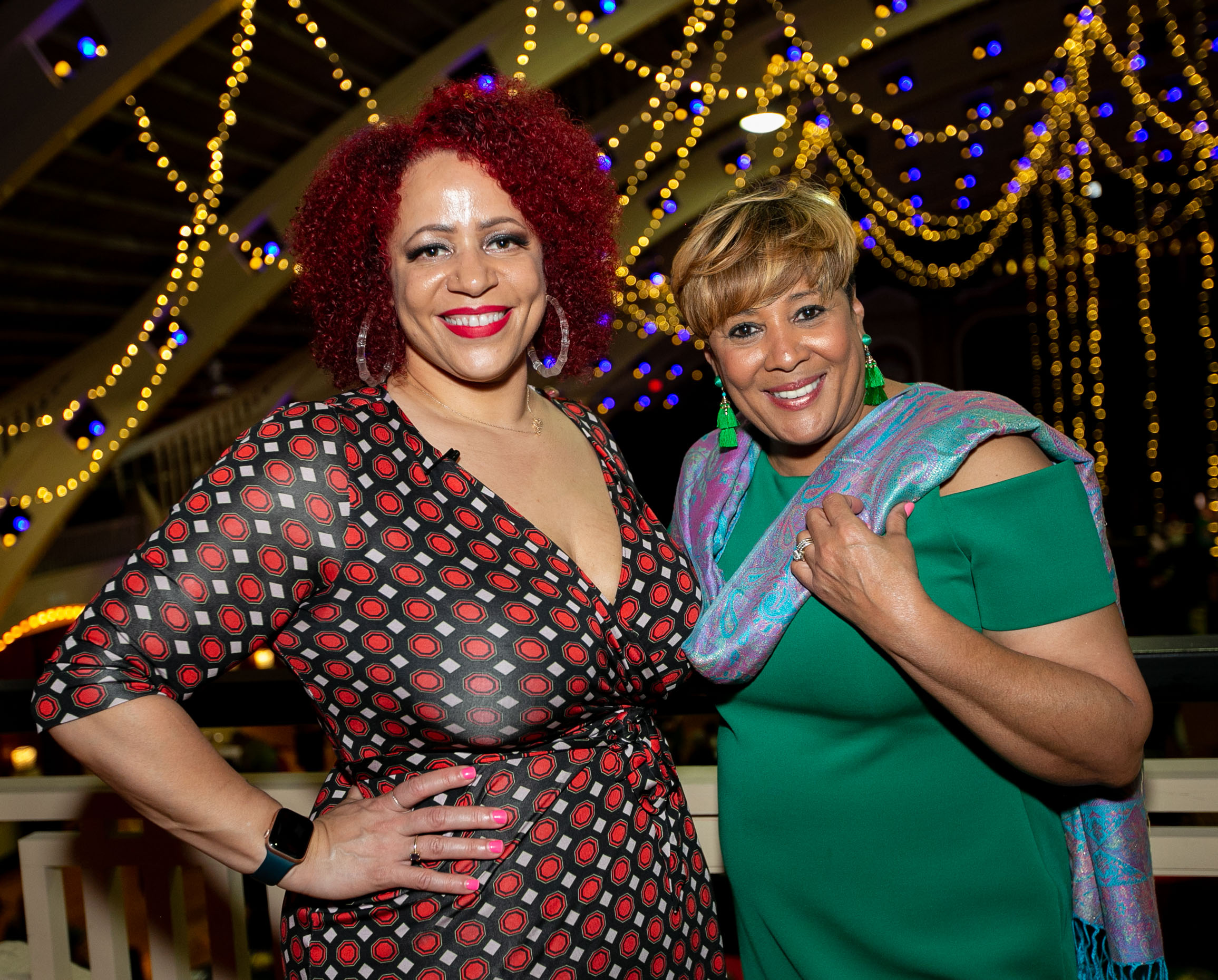
‘Terri Lipsey Scott is doing God’s work in this state,’ said Nikole Hannah-Jones about Scott’s work to preserve African-American history.
Hannah-Jones argues that the year 1619 should not replace the year 1776 as the country’s founding, but that what it would mean in our current understanding of the country’s divisions and tensions if we marked the founding not at the “ideals of liberty but at the practice of slavery, and how the practice of slavery would shape the country that would be founded in the year 1776.”
“I personally don’t think it’s that radical but apparently some folks, and clearly your governor does,” she quipped.
The “1619 Project,” Hannah-Jones said, tries to place slavery and the contribution of Black Americans at the center of the American story and, in some ways, tries to answer the question that every Black person will be asked sometime in their lives: “Slavery was a long time ago, why don’t you get over it?”
Hannah-Jones said “The 1619 Project” seeks to answer that Black America can’t get over it because the country can’t get over it.
“And if you look across all of the areas of modern American life, slavery is shaping our country whether we acknowledge it or not,” she averred. “Nobody wants to get over slavery more than Black people, OK? It does not benefit us. But an institution this old, if we believe that the Constitution still matters all these years later, that the Declaration of Independence still matters all of these years later, then certainly slavery — which lasted for 250 years — matters all of these years later.”
Last year, a bill that would defund any school district caught teaching the “1619 Project” was introduced. Hannah-Jones’ work of long-form journalism was never intended to supplant traditional curriculum but to be a supplement and give another perspective on American history.
The language in the bill that Senators Tom Cotton and Mitch McConnell put forth said: “The Federal Government has a strong interest in promoting an accurate account of the Nation’s history through public schools and forming young people into knowledgeable and patriotic citizens.”
Hannah-Jones asked the audience to think about what that bill means. She feels it’s saying that history class isn’t necessarily meant to teach what happened in the past and how to understand the country better, but to groom us to be patriots. She doesn’t think there’s anything wrong with patriotism, but the bill says there is only a specific type of patriotism that is acceptable.
She directs readers to the opening essay in the “1619 Project” called “Democracy,” which she said was the most patriotic thing she’s ever written.
“The one group of people who never chose to come here, who didn’t want to come here, who were forced to cross the Atlantic into the United States have believed in this country with a fervor that outpaces any other group who have fought year after year, decade after decade to make this country live up to its highest ideals no matter how poorly this country treated us. That is true patriotism.”
The bill goes on to say that “The true day of America’s founding is July 4, 1776” and that “The self-evident truths set forth by that Declaration are the fundamental principles upon which America was founded.”
Hannah-Jones said “The 1619 Project” is not arguing those points but that the Founding Fathers didn’t actually believe in those principles even though they articulated them.
The bill also says: “An activist movement is now gaining momentum to deny or obfuscate this history by claiming that America was not founded on the ideals of the Declaration but rather on slavery and oppression.”
“That’s actually a fact, OK,” said Hannah-Jones. “The Constitution allows for slavery; the Constitution incentivizes slavery. We’ve all heard of the Three–fifths Compromise, right? The Constitution does not mention slavery until the 13th Amendment abolishes it because our founders knew slavery was wrong and they were ashamed…”
Hannah-Jones moved on to Donald Trump and him arming the Department of Education to investigate the schools that may be teaching the “1619 Project.” She said if we heard about the Chinese or Cuban governments investigating schools for teaching ideas that were critical of their government, we would be appalled.
“But somehow, because it’s in the United States, we’re accepting of a government that is saying that it will defund and investigate schools that teach ideas that they don’t like.”
While in office, Trump commissioned a counter to the “1619 Project” called the “1776 Commission,” which did not include a single historian or professor of history and was released on Martin Luther King, Jr. Day.
“And it was a report that was basically saying, ‘Yeah, you know, we did some bad things like slavery, but we don’t need to talk about that.’”
One of the first things President Joe Biden did when he took office was to rescind the order and purged the “1776 Commission” from the website.
Cotton and McConnell’s bill died in the Democrat-controlled House of Representatives, so bills with similar language started popping up in state legislature. Also, states all over the country began propaganda campaigns against Critical Race Theory.
It’s been said repeatedly that CRT is not taught in schools, but that hasn’t stopped the propaganda machine from rolling full steam ahead. Hannah-Jones said she would be “extremely impressed” if K-12 could tackle such sophisticated thought.
“Because all Critical Race Theory seeks to do is to say 60 years outside of the end of the Civil Rights Movement, why are Black Americans still at the bottom of every indicator of well-being? And to argue that a country that for 350 years engaged in explicit racial discrimination, that perhaps after 60 years, that discrimination built into our institutions can still replicate inequality.”
Hannah-Jones closed the evening out by giving the audience some homework. She said we could refuse to accept that this is the country it has to be.
“’The [moral] arc of the universe,’ Dr. King says, ‘is long, but it bends towards justice.’ I do respect Dr. King, but I don’t believe that. The arc of the universe is a circle; unless we bend it, it doesn’t bend on its own. So, we either let it keep going back on itself and we keep repeating the same history and patterns, or we bend that arc towards justice, and I hope you all leave tonight with a commitment to bend that arc towards justice and refuse to be the country of our past.”
Each Woodson Warrior Scholarship recipient is eligible for up to $20,000 over their four-year college career, $5,000 per year depending on their GPA, with a minimum of $2,500 per year.

